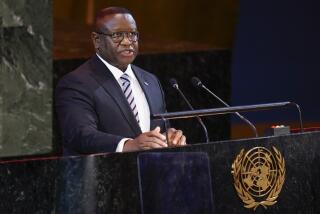Crowds in Lesotho Celebrate Coup
- Share via
MASERU, Lesotho — Thousands of people poured into the streets here Monday, cheering and dancing to celebrate a military coup ending the 20-year rule of Lesotho’s prime minister, Chief Leabua Jonathan.
For most, Jonathan’s ouster seemed to mean an end to Lesotho’s confrontation with South Africa, which surrounds the tiny mountain kingdom, and to the economic blockade South Africa imposed on the country three weeks ago.
Little apprehension was expressed about the takeover of the government early Monday by Maj. Gen. Justin M. Lekhanya, the politically conservative commander of Lesotho’s 3,000-man paramilitary force.
Lekhanya’s calls for national reconciliation and a return to the traditional values of this highly conservative society were broadcast throughout the day on the state-run radio here and appeared to calm Lesotho’s 1.5 million people.
Loyalty to Monarch
Lekhanya, an up-from-the-ranks policeman-turned-soldier, who is about 55, disclosed none of his plans Monday. The only clue to his policies has been his professed allegiance to Lesotho’s King Moshoeshoe II, the country’s respected monarch.
Apart from a victory cavalcade through Maseru’s main streets, only a few soldiers were evident around the capital most of Monday. The new military government nonetheless imposed a 6 p.m.-to-6 a.m. curfew, closed the country’s airfields and reportedly placed Jonathan and his ministers under house arrest.
South Africa welcomed the coup by easing its blockade, which had begun to strangle Lesotho’s small economy, and resumed rail service into the country. The first freight train Monday afternoon was greeted with shouts of joy, and Maseru residents rushed into the street to cheer its arrival.
In Cape Town, Foreign Minister Roelof F. (Pik) Botha said that South Africa hopes Lesotho’s change in government will bring an improvement of relations between the two countries and a return to normalcy at their border.
Diplomats now expect new efforts by both sides at resolving their dispute over the shelter that Lesotho has traditionally offered refugees fleeing from the rigors of apartheid in South Africa.
What Lekhanya will do is uncertain, although he took part in the talks Friday with South Africa on relations between the two countries. Diplomats speculate that South Africa might relent on its demands because it trusts Lekhanya, as a soldier, to curb the African National Congress more effectively than Jonathan did.
For South Africa’s other neighbors, the coup was a reminder of the profound political impact that economic sanctions by Pretoria could have on them. Also, the three-week-old blockade forcefully brought Lesotho’s own internal political conflicts into the open.
Virtually all of South Africa’s black-ruled neighbors are economically dependent on it, although none so totally as Lesotho. Pretoria has often warned in the last year that if international sanctions are applied against it, then it will retaliate against its neighbors.
Inevitably, there was speculation that South Africa may have played an active role in the coup, but there was no immediate evidence of such involvement.
To most political observers, the coup appeared to have been the climax of a crisis that began Wednesday. Then, troops surrounded Jonathan’s office, and senior officers gave him an ultimatum on handling the confrontation with South Africa, curbing the militant Youth League of the Basutoland National Party and resolving other problems.
What may have prompted the military to act early Monday were declarations made to reporters by Jonathan on Sunday that seemed to renege on earlier promises to take an easier line with South Africa.
Few Tears Shed
Jonathan, 71, had become increasingly autocratic, according to political observers here, and few people seemed sorry on Monday that he had been deposed.
While the confrontation with South Africa and the economic blockade appear to many political observers to have sparked the coup, domestic political developments over the last six months seem to be equally important.
Jonathan, according to political observers, had relied increasingly on the leftist Youth League of his ruling Basutoland National Party to maintain power. He had armed them and arranged military training for them by North Korean instructors--moves that greatly angered the paramilitary force.
The Youth League became particularly controversial in August and September, when its attacks on opposition politicians led them to withdraw totally from planned elections, the first in 15 years, which were then canceled.
On Monday, some Maseru residents said the Youth League had conducted a virtual reign of terror for much of the last year, and many people on the streets shouted slogans against the Youth League.
More to Read
Sign up for Essential California
The most important California stories and recommendations in your inbox every morning.
You may occasionally receive promotional content from the Los Angeles Times.













